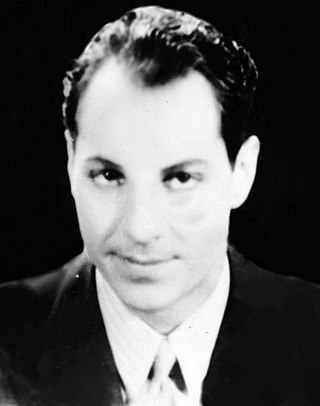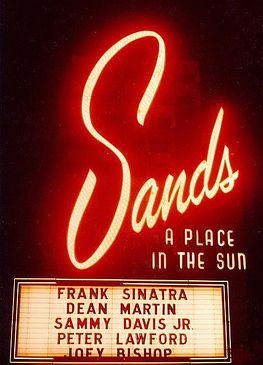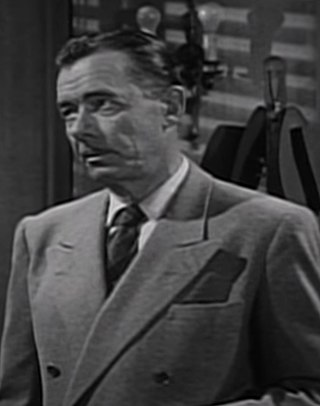Related Research Articles

Francis Albert Sinatra was an American singer, actor and producer. Nicknamed the "Chairman of the Board" and later called "Ol' Blue Eyes", Sinatra was one of the most popular entertainers of the 1940s, 1950s, and 1960s. He is among the world's best-selling music artists with an estimated 150 million record sales.

Julius Henry "Groucho" Marx was an American comedian, actor, writer, stage, film, radio, singer, television star and vaudeville performer. He is generally considered to have been a master of quick wit and one of America's greatest comedians.

The Marx Brothers were an American family comedy act that was successful in vaudeville, on Broadway, and in motion pictures from 1905 to 1949. Five of the Marx Brothers' thirteen feature films were selected by the American Film Institute (AFI) as among the top 100 comedy films, with two of them, Duck Soup (1933) and A Night at the Opera (1935), in the top fifteen. They are widely considered by critics, scholars and fans to be among the greatest and most influential comedians of the 20th century. The brothers were included in AFI's 100 Years... 100 Stars list of the 25 greatest male stars of Classical Hollywood cinema, the only performers to be included collectively.
Nancy Sandra Sinatra is an American singer and actress. She is the elder daughter of Frank Sinatra and Nancy Sinatra, and is best known for her 1966 signature hit "These Boots Are Made for Walkin'".

Arthur "Harpo" Marx was an American comedian, actor, mime artist, and harpist, and the second-oldest of the Marx Brothers. In contrast to the mainly verbal comedy of his brothers Groucho and Chico, Harpo's comic style was visual, being an example of vaudeville, clown and pantomime traditions. He wore a curly reddish blond wig and was silent in all his movie appearances, instead blowing a horn or whistling to communicate. Marx frequently employed props such as a horn cane constructed from a lead pipe, tape, and a bulbhorn.

Herbert Manfred "Zeppo" Marx was an American comedic actor, theatrical agent, and engineer. He was the youngest and last survivor of the five Marx Brothers. He appeared in the first five Marx Brothers feature films, from 1929 to 1933, but then left the act to start his second career as an engineer and theatrical agent.

Ernestine Jane Geraldine Russell was an American actress, singer, and model. She was one of Hollywood's leading sex symbols in the 1940s and 1950s. She starred in more than 20 films.
Harry Rubenstein, known professionally as Harry Ruby, was an American actor, pianist, composer, songwriter and screenwriter, who was inducted into the Songwriters Hall of Fame in 1970. He was married to silent film actress Eileen Percy.

"These Boots Are Made for Walkin'" is a hit song written by Lee Hazlewood and recorded by American singer Nancy Sinatra. It charted on January 22, 1966, and reached No. 1 in the United States Billboard Hot 100 and in the UK Singles Chart.

The Sands Hotel and Casino was a historic American hotel and casino on the Las Vegas Strip in Nevada, United States, that operated from 1952 to 1996. Designed by architect Wayne McAllister, with a prominent 56-foot (17 m) high sign, the Sands was the seventh resort to open on the Strip. During its heyday, it hosted many famous entertainers of the day, most notably the Rat Pack and Jerry Lewis.
Flywheel, Shyster, and Flywheel is a situation comedy radio show starring two of the Marx Brothers, Groucho and his older brother Chico Marx, and written primarily by Nat Perrin and Arthur Sheekman. The series was originally broadcast in the United States on the National Broadcasting Company's Blue Network beginning November 28, 1932, and ended May 22, 1933. Sponsored by the Standard Oil Companies of New Jersey, Pennsylvania and Louisiana and the Colonial Beacon Oil Company, it was the Monday night installment of the Five-Star Theater, an old-time radio variety series that offered a different program each weeknight. Episodes were broadcast live from NBC's WJZ station in New York City and later from a sound stage at RKO Pictures in Los Angeles, California, before returning to WJZ for the final episodes.

Double Dynamite is a 1951 American musical comedy film directed by Irving Cummings and starring Jane Russell, Groucho Marx, and Frank Sinatra. The film was written by Leo Rosten (story), Melville Shavelson (screenplay), Mannie Manheim, and Harry Crane.
Constantin Romanovich Bakaleinikov was a Russian-born composer who worked in Hollywood, California.

Frank Sinatra in Hollywood 1940–1964 is a 2002 compilation album by the American singer Frank Sinatra.

Copacabana is a 1947 American musical comedy film directed by Alfred E. Green starring Carmen Miranda and Groucho Marx.

Step Lively is a 1944 American musical film directed by Tim Whelan and starring Frank Sinatra. Step Lively was based on the 1937 play Room Service, by Allen Boretz and John Murray. It was a remake of the 1938 RKO film Room Service, starring the Marx Brothers, Lucille Ball, and Ann Miller.
"Our Town" is a 1955 episode of the American anthology series Producers' Showcase directed by Delbert Mann and starring Frank Sinatra, Paul Newman and Eva Marie Saint. Sinatra plays the stage manager and Paul Newman and Eva Marie Saint portray the teenagers who fall in love and get married. The episode is a musical adaptation of Thornton Wilder's 1938 play Our Town, with songs by Jimmy van Heusen and Sammy Cahn, mostly sung by Sinatra the stage manager between and during scenes from the play, and including a duet with Paul Newman and Eva Marie Saint. The 90-minute show was Sinatra's only performance in a dramatic role specifically for television until Contract on Cherry Street in 1977.

Russell Thorson was an American actor, perhaps best known for his co-starring role as Det. Lt. Otto Lindstrom in ABC's 1959–1962 hit crime drama, The Detectives Starring Robert Taylor.
An Evening With Groucho is the title of a 1972 compilation recording of the one-man show by American comedian Groucho Marx, edited from three separate performances: New York City's Carnegie Hall, C.Y. Stephens Auditorium at Iowa State University, and Masonic Auditorium in San Francisco, California. With the Carnegie Hall show’s introduction by Dick Cavett, the resulting performances were released as a double album by A&M Records. Marx shared family and show business stories and performed songs from Marx Brothers stage shows and movies. Marvin Hamlisch performed an opening overture and accompanied Groucho on the piano. A numbered, limited edition edited single picture disc edition was released in 1978, and a compact disc version was later briefly available.

RKO Radio Pictures Inc., commonly known as RKO Pictures or simply RKO, was an American film production and distribution company, one of the "Big Five" film studios of Hollywood's Golden Age. The business was formed after the Keith-Albee-Orpheum (KAO) theater chain and Joseph P. Kennedy's Film Booking Offices of America (FBO) studio were brought together under the control of the Radio Corporation of America (RCA) in October 1928. RCA executive David Sarnoff engineered the merger to create a market for the company's sound-on-film technology, RCA Photophone, and in early 1929 production began under the RKO name. Two years later, another Kennedy concern, the Pathé studio, was folded into the operation. By the mid-1940s, RKO was controlled by investor Floyd Odlum.
References
- ↑ Darwin Porter, Howard Hughes: Hell's Angel (Blood Moon Productions, 2005), ISBN 978-0974811819, p. 725. Excerpts available at Google Books.
- ↑ Tom Santopietro, Sinatra in Hollywood (Macmillan, 2009), ISBN 978-1429964746, pp. 115-116. Excerpts available at Google Books.
- ↑ "Vital Reissues", Billboard , August 24, 2002, p. 26.